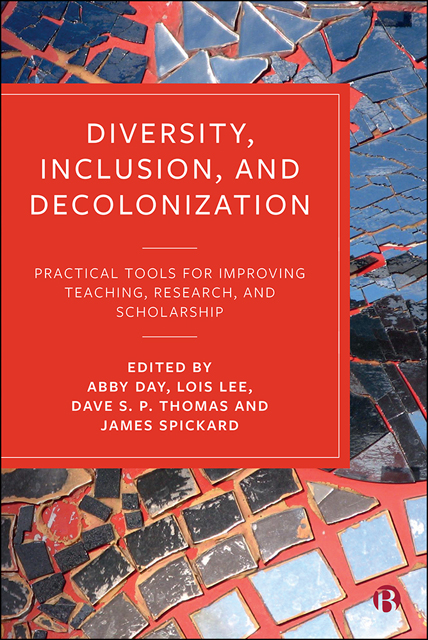 Diversity, Inclusion, and Decolonization
Diversity, Inclusion, and Decolonization Book contents
- Frontmatter
- Contents
- List of Figures and Tables
- Notes on Contributors
- Acknowledgements
- Typographical Note
- Introduction: Why Diversity, Inclusion, and Decolonization Matter
- Part I Changing Universities
- Part II Diversifying Curricula
- Part III Diversifying Research and Scholarship
- Part IV Overcoming Intellectual Colonialism
- Epilogue: What We Have Learned
- Index
11 - Whom We Cite: A Reflection on the Limits and Potentials of Critical Citation Practices
Published online by Cambridge University Press: 13 October 2022
- Frontmatter
- Contents
- List of Figures and Tables
- Notes on Contributors
- Acknowledgements
- Typographical Note
- Introduction: Why Diversity, Inclusion, and Decolonization Matter
- Part I Changing Universities
- Part II Diversifying Curricula
- Part III Diversifying Research and Scholarship
- Part IV Overcoming Intellectual Colonialism
- Epilogue: What We Have Learned
- Index
Summary
Introduction
For most scholars, an academic publication, either in journals or books, is the gold standard for sharing academic ideas and results (Kreienkamp et al, 2020). Once the publication is out there in the world, many judge the impact of an idea, study, or project by the publication’s citation numbers. These two focal points of publications and citations have in recent decades also driven a publication-and citation-based understanding of academic excellence for individuals (for example, h-index), publishers (for example, impact factor), and academic institutions (for example, institution rankings). While the intention of emphasizing ideas and outputs over a person’s background (for example, race, gender, country of origin, or seniority) is admirable and seemingly progressive, this approach creates challenges similar to many other equality-focused initiatives, namely that it does not necessarily provide equity or justice in a system that seems to favour some over others. Female scientists, scholars of colour, emerging scholars, and researchers from non-Western backgrounds often have less access to the publication process, are published in lower-impact journals, and are less frequently cited. This chapter discusses some of the biased processes that underlie the publication and citation process, introduces some counter-movements, and translates these into practical suggestions for individuals and institutions.
In this chapter, I propose the approach of critical citation practices, which I define as a conscious engagement with the people we cite throughout the academic research process. The chapter and its content are based on a conference I organized on ‘Critical Research Approaches and their Methods’ in 2018 and a workshop series I presented about critical citation practices1 at the University of Groningen in 2019. The majority of scholars I talked with during these workshops were well aware of the inequalities baked into academic structures and want to make their research more inclusive and diverse but simply did not know how. The main, reoccurring issues (especially for emerging scholars) were a lack of accessible information and structural education on citation practices as well as difficulties in applying the abstract ideas of critical research approaches in daily practice. The focus of this chapter is, therefore, expressly practical, and it explicitly discusses the role of emerging scholars.
- Type
- Chapter
- Information
- Diversity, Inclusion, and DecolonizationPractical Tools for Improving Teaching, Research, and Scholarship, pp. 170 - 185Publisher: Bristol University PressPrint publication year: 2022
